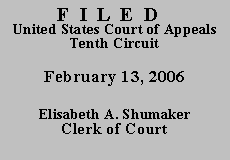

| RAPHAEL SIMS, |
|
| v. | |
| PATRICK SNEDEKER, Warden, |
I. Discussion
A prerequisite to federal jurisdiction over petitions for habeas relief is exhaustion of state remedies. 28 U.S.C. § 2254(b)(1)(A). In general,
[b]efore a federal court may grant habeas relief to a state prisoner, the prisoner must exhaust his remedies in state court. In other words, the state prisoner must give the state courts an opportunity to act on his claims before he presents those claims to a federal court in a habeas petition.
O'Sullivan v. Boerckel, 526 U.S. 838, 842 (1999). This court has further explained that state claims remain unexhausted if state proceedings remain pending at the time the petition is filed. Robertson v. Utah, 119 F. App'x 212 (10th Cir. 2004) (unpublished).
Sims filed a habeas corpus petition in New Mexico state court on October 26, 2004 and (without waiting for a decision) filed a petition for a writ of certiorari to the New Mexico Supreme Court on December 3, 2004. Less than two months later, Sims filed this federal habeas petition on January 31, 2005. Apparently due to a combination of miscommunication and his own impatience, Sims filed a second federal habeas petition on March 25, 2005. The District of New Mexico dismissed both petitions without prejudice on April 6, 2005, holding that because Sims's state habeas petition was still pending in the New Mexico state courts, the state claims were unexhausted. The district court reaffirmed its dismissal on July 26, 2005 in response to Sims's timely motion for reconsideration under Fed. R. Civ. P. 59(e). Given that Sims conceded his state habeas petition was still pending at the time the district court reviewed the federal petition, the district court correctly dismissed his federal habeas corpus petition for failure to exhaust state remedies.
On appeal, Sims appears to argue that his failure to exhaust should be excused. (Pet. Br. at 4). Construing his argument liberally, Sims asks us to hold that New Mexico's failure to rule on his habeas corpus petition constitutes an "absence of available state corrective process" or creates circumstances that render such process "ineffective to protect his rights" under 28 U.S.C. § 2254(b)(1)(B). This provision provides:
An application for a writ of habeas corpus on behalf of a person in custody pursuant to the judgment of a State court shall not be granted unless it appears that . . .
(B)(I) there is an absence of available State corrective process; or
(ii) circumstances exist that render such process ineffective to
protect the rights of the applicant.
Under our cases construing the predecessor to this provision, we must ordinarily defer to state processes:
comity requires that the petitioner exhaust his state appeals unless he can show such "inordinate, excessive and inexcusable delay" in the state appeal process that exhaustion would render his rights ineffective to review the alleged trial errors.
Harris v. Champion 938 F.2d 1062, 1069 (10th Cir. 1991) (citing Jones v. Crouse, 360 F.2d 157, 158 (10th Cir. 1966)). Sims made no showing to the district court that his state habeas petition was languishing as a result of inordinate, excessive and inexcusable delay. In fact, it would have been virtually impossible for him to do so: at the time of the district court's dismissal of his petition, Sims's state habeas petition had been before the New Mexico courts for only five and a half months.
In the past, we have held that a delay of fifteen months in adjudicating a state petition may give rise to "grave concerns in the realm of due process." Prescher v. Crouse, 431 F.2d 209, 211 (10th Cir. 1970) (holding on the basis of evidence presented that "special circumstances" excused a fifteen-month delay). And we have allowed an evidentiary hearing to determine whether a delay of eighteen months is inordinate or inexcusable under the statute. See Jones, 360 F.2d at 158. Sims, however, has not provided any showing of substantial delay in this case attributable to state officials or any effect by the alleged delay on his claims for review. Accordingly, the district court properly dismissed petition for failure to exhaust state remedies.
II. Conclusion
For the foregoing reasons, we AFFIRM the district court, and DENY
Sims's request for a certificate of appealability.
Entered for the Court
Timothy M. Tymkovich
Circuit Judge
*. This order is not binding precedent, except under the doctrines of law of the case, res judicata, and collateral estoppel. The court generally disfavors the citation of orders; nevertheless, an order may be cited under the terms and conditions of 10th Cir. R. 36.3.
2. After examining the briefs and the appellate record, this three-judge panel has determined unanimously that oral argument would not be of material assistance in the determination of this appeal. See Fed. R. App. P. 34(a); 10th Cir. R. 34.1(G). The cause is therefore ordered submitted without oral argument.
1. We construe Sims's appellate filings liberally. See Cummings v. Evans, 161 F.3d 610, 613 (10th Cir. 1998).